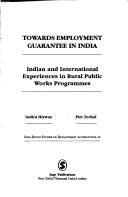| Listing 1 - 3 of 3 |
Sort by
|
Multi
ISBN: 9221172074 9221172066 Year: 2005 Publisher: Paris : OECD Publishing,
Abstract | Keywords | Export | Availability | Bookmark
 Loading...
Loading...Choose an application
- Reference Manager
- EndNote
- RefWorks (Direct export to RefWorks)
This study analyses the impact of democratic decentralisation on the chances of socially excluded groups to participate in newly created local governance institutions – Panchayati Raj Institutions – in three Indian states. This institutional reform included a quota for the disadvantaged – women and lower castes – to ensure their effective participation. The comparative analysis on the determinants of participation of these groups and the poor vis-à-vis other groups across the states of Kerala, Tamil Nadu and Madhya Pradesh yields highly interesting results, relevant beyond the Indian context. First, the outcomes of decentralisation on participation are different across states and between different marginalised groups. While in Kerala socially disadvantaged groups and the poor are represented more than other groups at the Panchayat level, in Tamil Nadu and Madhya Pradesh the socially disadvantaged groups are as represented as the others whereas the poor continue to be largely ...

ISBN: 0803991924 Year: 1994 Publisher: New Delhi Thousand Oaks, Calif. Sage Publications
Abstract | Keywords | Export | Availability | Bookmark
 Loading...
Loading...Choose an application
- Reference Manager
- EndNote
- RefWorks (Direct export to RefWorks)
Book
ISBN: 0804787964 0804791023 9780804791021 9780804787963 Year: 2014 Publisher: Stanford, California
Abstract | Keywords | Export | Availability | Bookmark
 Loading...
Loading...Choose an application
- Reference Manager
- EndNote
- RefWorks (Direct export to RefWorks)
Throughout the 20th century, electricity was considered to be the primary vehicle of modernity, as well as its quintessential symbol. In India, electrification was central to how early nationalists and planners conceptualized Indian development, and huge sums were spent on the project from then until now. Yet despite all this, sixty-five years after independence nearly 400 million Indians have no access to electricity. Electrifying India explores the political and historical puzzle of uneven development in India's vital electricity sector. In some states, nearly all citizens have access to electricity, while in others fewer than half of households have reliable electricity. To help explain this variation, this book offers both a regional and a historical perspective on the politics of electrification of India as it unfolded in New Delhi and three Indian states: Maharashtra, Odisha, and Andhra Pradesh. In those parts of the countryside that were successfully electrified in the decades after independence, the gains were due to neither nationalist idealism nor merely technocratic plans, but rather to the rising political influence and pressure of rural constituencies. In looking at variation in how public utilities expanded over a long period of time, this book argues that the earlier period of an advancing state apparatus from the 1950's to the 1980's conditioned in important ways the manner of the state's retreat during market reforms from the 1990's onward.
Electric utilities -- Government policy -- India -- History. --- India -- Economic policy -- 1947-. --- Rural development -- Government policy -- India -- History. --- Rural electrification -- India -- History. --- Rural electrification --- Electric utilities --- Rural development --- Business & Economics --- Industries --- History --- Government policy --- India --- Economic policy --- History. --- Community development, Rural --- Development, Rural --- Integrated rural development --- Regional development --- Rehabilitation, Rural --- Rural community development --- Rural economic development --- Electric companies --- Electric light and power industry --- Electric power industry --- Citizen participation --- Social aspects --- Agriculture and state --- Community development --- Economic development --- Regional planning --- Electric industries --- Energy industries --- Public utilities --- Electrification --- Electricity in agriculture --- Remote area power supply systems --- Rural public utilities
| Listing 1 - 3 of 3 |
Sort by
|

 Search
Search Feedback
Feedback About UniCat
About UniCat  Help
Help News
News